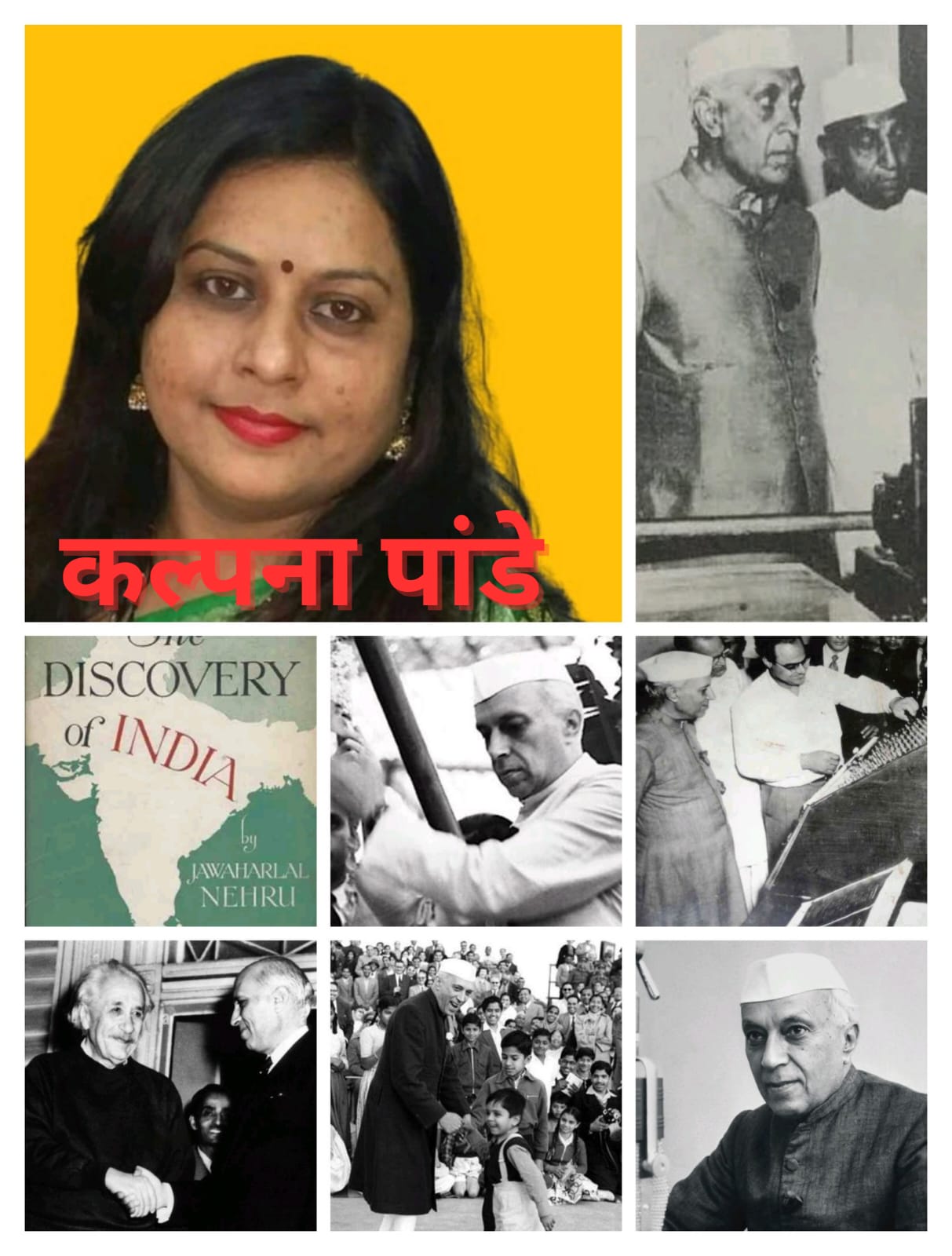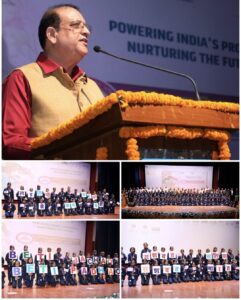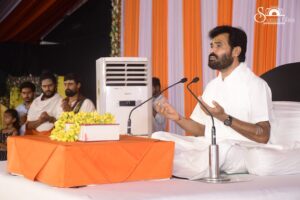After so many years, we should shamefully admit that in this era of religious pomp, hypocrisy, superstition spreading and conservative thinking, religious leaders of all religions have increasing influence and political patronage for votes, the Nehruvian understanding of scientific approach and Indian Its real in contextThere is now a deep gap between usage and implementation.That is why Nehru is as relevant today as he was at that time.Today, when there is a flood of religious leaders and leaders spreading superstition everywhere in the country, about seventy years ago Pandit Jawahar Lal Nehru had said that, ‘Politics took me towards economics and it essentially gave me science and all its knowledge. Towards adopting a scientific approach towards problems and lifeInspired.
induced
Only science can solve the problems of hunger and poverty. Science is the only medium which can eliminate hunger and poverty.’ He is full of foresight and is far-sighted.
Jawaharlal Nehru’s concept of scientific temper is a rational approach, which he believed should be an integral part of one’s thinking and actions. There was no contradiction in his mind between science and religion. He believed that science was not like religion, which depended on intuition and emotion. Nehru believed that science could help people see traditional beliefs in a new light, and that religion could lead to intolerance, superstition and irrationality. According to Nehru, scientific thinking is a way of life, a process of thinking, and a way of working. This includes being open to new evidence, changing conclusions, and relying on observed facts. Nehru believed that the spread of scientific thinking would reduce the scope of religion. Nehru stressed the importance of scientific thinking and believed that it should be promoted at the individual, institutional, social and political levels.
Even before independence, Nehru had said in a meeting of the Indian Science Congress in 1938: ‘Science is the real nature of life. Only with the help of science can the problems of hunger, poverty, sophistry and illiteracy, superstition and dangerous customs and orthodox traditions, our vast resources being wasted, hungry people and people with rich heritage be solved. A more prosperous future than today’s situation will belong to those who strengthen their connection with science.
Nehru had described the scientific approach in his book ‘Discovery of India’ in 1946 as a way to find public welfare and truth. The scientific approach emphasizes objective analysis of the root causes of a situation. The main or essential characteristics of scientific methodology are curiosity, observation, experiment, qualitative and quantitative analysis, mathematical modeling and prediction. According to Nehru, this is not so, this scientific methodology can be applied to all the tasks of our life because it originates from the curiosity of all of us. Therefore, every person, whether a scientist or not, can have a scientific outlook. Actually, scientific approach develops our general understanding about every phenomenon of daily life. According to Nehru ji, by adopting this trend in life, one can get freedom from superstitions and prejudices.
Nehru writes on page 512 of his 1946 book Discovery of India “Today the applications of science are indispensable and irreplaceable for all countries and peoples. But there is more to it than just its application. This is the scientific approach, the adventurous and yet critical nature of science, the search for truth and new knowledge, the refusal to accept anything without trial and testing, the ability to change previous conclusions in the face of new evidence, predetermined Relying not on theory but on observed fact, toughness of mindDiscipline – all this is necessary not only for the application of science but also for the solution of life and its many problems…” Nehru gave more importance to the scientific approach than to the application of science. It is clear that without such scientific approach neither development of society nor new science is possibleNehru envisioned India as an independent nation and strove for a modern India where people, free from preconceptions and religious dogmas, could understand the world around them, develop their own The scientific method to improve life and solve social problemsWill use.Emphasizing the importance of science and its applications in meeting the needs of the country and its people, Nehru described science and technology as a critical approach to thinking and reasoning, ‘a way of life’ and ‘the nature of the free man’. Defined in.
Therefore, Nehru not only recognized the material and practical benefits of pursuing science and technology for the development of the nation, but he also strongly advocated science (including the scientific method, outlook and temperament) as a philosophical approach to life. and gave its supporting arguments. Nehru had a deep interest in the culture of science as much as in material achievements. Hence he repeatedly used the terms “scientific temperament” and “spirit of science”. His understanding of science was philosophical. This enabled him to base his social ideals and political beliefs on rationality, develop his secular worldview and the concepts of scientific socialism, and put them forward to the world as part of his ideas and methodology. At the Science Congress in 1951 he said, “My interest lies primarily in trying to make the Indian people and even the Government of India aware of scientific work and its necessity.” He clearly states that science alone has ensured that society does not return to the kind of barbarism that religious fanaticism and reactionary conservatism have repeatedly threatened. That is why no central government could do as clearly as Nehru who could condemn Hindu and Muslim communalists and call them extremely backward and keep these elements away from the government.
After India’s independence, our country was led by the creator of modern India, Jawaharlal Nehru, with the challenges of implementing the new Constitution. This first Prime Minister of the country was well aware that our people including scientists were gripped by irrationality, religious conservatism and superstitions. Nehru believed that there was only one way to make India a developed nation – to link science and technology with development. As Prime Minister, Nehru created scientific establishments in accordance with his scientific ideas. In August 1947 he created a central government portfolio for scientific research under his direction. In 1951, the Ministry of Natural Resources and Scientific Research was formed which further expanded into the Department of Scientific Research. Nehru continued to lead debates in Parliament on scientific matters, address the annual meetings of the Indian Science Congress, and chair the governing body of the Council of Scientific and Industrial Research. He valued his scientists as the patron and guide of India’s post-colonial science. These include Director General of Council of Scientific and Industrial Research S.S. Bhatnagar, India’s planning system statistician P.C. Mahalanobis and Atomic Energy Commission of India Chairman Homi K. Bhabha was included. Nehru maintained his personal control over the Department of Atomic Energy. His keen interest in nuclear energy ensured that it emerged as an important energy source and a symbol of India’s scientific modernity. His relationship with Bhabha was particularly close, making possible privileged funding for the nuclear power programme. That is why Nehru’s time was the era of flourishing of Indian science. At that time the concepts of pseudoscience were not promoted in any way by the government.
It was Nehru who added the word ‘scientific temper’ (scientific outlook) to our vocabulary. He writes in Discovery of India: ‘In today’s time, it is mandatory and inevitable for all countries and people to use science. But one thing is more important than using science and that is the scientific method which is adventurous but also very important and through which scientific approach flourishes i.e. discovery of truth and new knowledge, do not accept anything without testing it. The courage to accept, to change old conclusions based on new evidenceThe ability to rely on observed facts rather than preconceived notions, to direct the mind in a disciplined direction – all this is absolutely essential. Not only because it will lead to the use of science, but also for the sake of life itself and to solve its innumerable complexities…the scientific approach shows man the path on which he should undertake his life’s journey. This vision is for a person who is free from bondage, free.’
Nehru made many efforts for the development of scientific approach in India. One of these efforts is that he gave special importance to the scientific approach while presenting the science and technology policy in the country’s Parliament (Lok Sabha) in 1958. He described the scientific approach as a way of thinking, a way of working and a way of finding truth. This was the first example for the whole world, when the Parliament of any country had passed a science policy proposal. He said that the scientific approach does not mean merely looking into a test tube, mixing this thing and that thing and creating small or big things. Scientific approach means training the mind and the entire structure of life to work with the methods and methodology of science. Scientific approach is related to rationality. According to the scientific point of view, only that thing is worthy of acceptance which can be proven through experiment and results, in which cause-and-effect relationships can be established. Discussion, reasoning and analysis are an important part of the scientific approach. Scientific approach is also effective in creating fairness, humanity, democracy, equality and freedom etc.
‘To develop scientific temper, humanism and the spirit of discovery and improvement’ was declared one of the ten fundamental duties of every citizen in the Indian Constitution under Article 51A(H) as part of the 42nd Constitutional Amendment in 1976. It is also necessary to combine science and technology with the spirit of humanism because ultimately the goal of every kind of progress is the development of human beings and the quality of life and its relationship. Development of this scientific approach in our children and society will be a true tribute to Nehruji.













